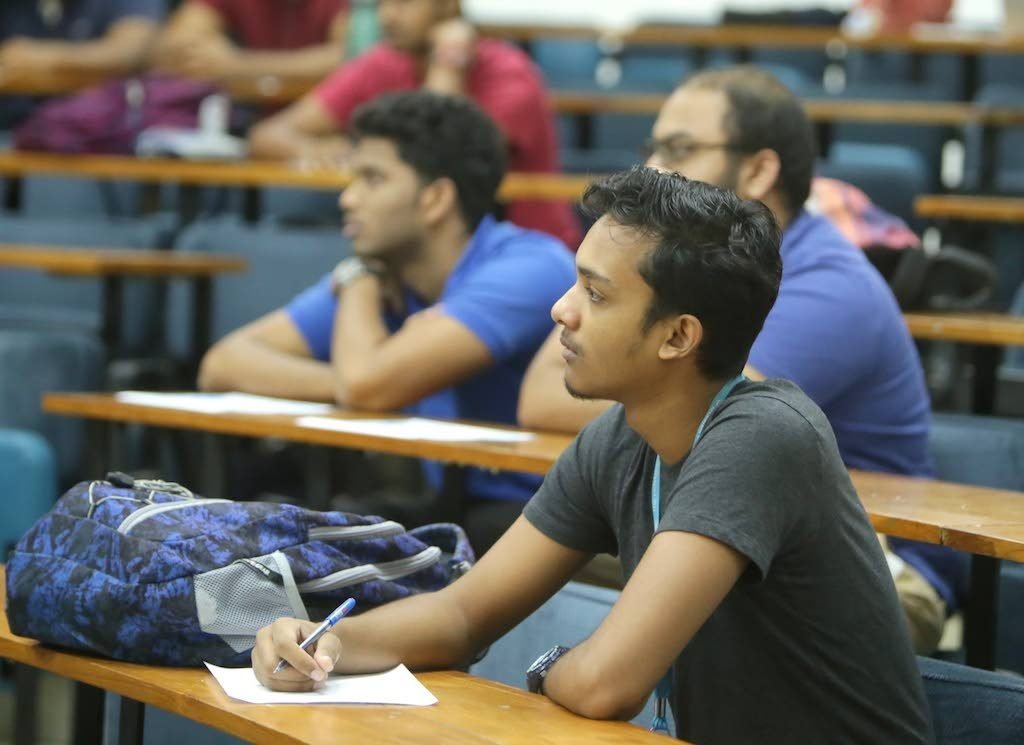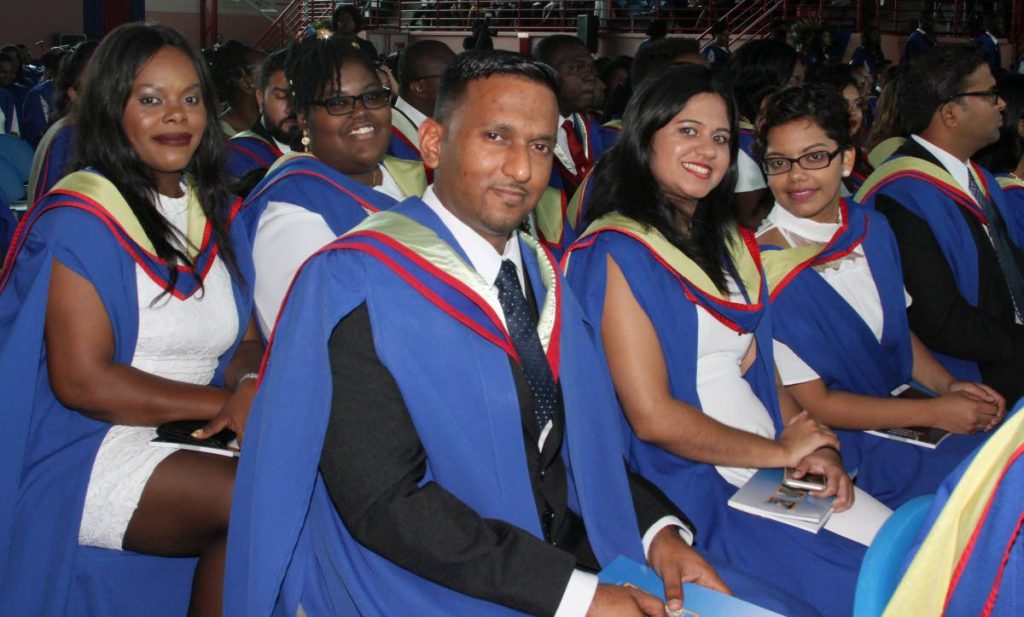UWI new student admissions drop below 5,000 for the first time in 12 years

FOR the first time in 12 years, new student admissions at UWI St Augustine, has dipped below 5,000.
And UWI principal Brian Copeland said in the future, the university may be forced to cut some courses.
Data from UWI’s Campus Office of Planning and Institutional Research for the 2020-2021 academic year showed 4,566 new students enroled, a decrease of more than 1,000 from the previous year, when 5,766 new students were enroled.
This includes undergraduate and graduate applications, offers and new admissions – with TT nationals accounting for over 90 per cent of the students – for UWI’s St Augustine campus, Arthur Lok Jack School of Business and the Mt Hope School of Nursing.
There was a peak in applicants and enrolments in 2011, then a steady decline starting in 2018.

For the Arthur Lok Jack School of Business, which enrolled 293 new students in 2019, an 83 per cent decrease means only 48 new students enrolled for the 2020-2021 academic year.
Covid19, changes to the Government Assistance for Tuition Expenses (GATE), a 75 per cent slash in government scholarships, declining oil markets and a tumultuous global economy – TT’s education institutions and students are feeling the strain.
Nazim Mohammed, 22, is a year two student doing a degree in sociology with a minor in history at UWI.
Mohammed, who has dreams of becoming a secondary school teacher, is now anxious about his academic future and is doubtful he will pursue a postgraduate degree after his employer retrenched him in March 2020, and also because of the government’s decision to restructure GATE.
Education Minister Dr Nyan Gadsby-Dolly recently announced that GATE funding for postgraduate students is no more. Previously, postgraduate students were funded up to 50 per cent of their tuition expenses.
“When I finished with my (bachelor's) degree I had the intention to complete a diploma in education. However, I am only able to attend university because GATE is available. Therefore, I do not see myself doing any postgraduate programme, because I don’t think I can afford the full tuition. It is impossible.”
Mohammed has taken a student loan to help him pay his rent and support his studies. He often finds himself questioning whether the mental, emotional and financial stress caused by his degree is worth it.
“The whole covid situation...really plays on my mental (health)...As a student I’m thinking...is studying this degree worth all this sacrifice?”
UWI guild: Students are frustrated
President of UWI’s student guild Warren Anderson believes the country’s economic woes have directly contributed to UWI’s declining admissions.
“The economic situation is definitely a factor. The global economy was already due for shrinkage and recession and we were already experiencing the impact. People who are in the prime of their youth, around the typical age that you would find enroling in tertiary education, would now have to weigh the opportunity cost and say to themselves, ‘Instead of this money going toward my education, let me seek some income and put off my education for a while,’” Anderson explained.

UWI relies heavily on Caricom subventions from contributing countries for the financial support of its students. UWI’s financial information for 2020-2021 showed contributing governments pay 80 per cent of the cost for undergraduates.
Anderson believes many students were frustrated by TT’s educational landscape even before the recent cuts in the GATE programme and the onslaught of covid19.
“Covid came and exacerbated TT’s economic woes, but there would have been people who would have already been anticipating a restructuring and told themselves that instead of risking it, let me make the sacrifice and get a job.”
Anderson also argued that although many students were faced with financial challenges by the loss of income due to the pandemic, declining admissions at UWI for the 2020-2021 academic year may not necessarily be due to the challenging economic climate.
As he puts it, there is a view about online learning that “leans toward disdain.”
“It could be out of a lack of knowledge or just traditional views. A potential student may have rationalised that covid19 has changed the mode of learning and they’d like to ride that out and do their programme in a physical setting, and not online, where they have to grapple with all the issues that they may face with connectivity and using their devices, etc.”
Anderson believes the same kind of perception may transfer into the next academic year, leading to a further decline in new student admissions.
He also said for his peers pursuing postgraduate learning, postgraduate tuition fees may be a struggle.
“Some people would not want to risk GATE funding being cut in the middle of their programme. Even if people have GATE access, they still have to make a decision based on their ability to fund that other 50 per cent for postgraduate programmes.”
GATE changes not only to blame
For Copeland, who became campus principal in 2016, GATE changes aren’t the only reason for lower enrolment of new students.
Copeland said statistics show UWI’s catchment area – students coming out of school around age 18 – is dropping. He says this is because the average age of the population is increasing, compared to a few years ago. This, he said, will lead to a decrease in new student admissions, especially at the undergraduate level.
Copeland also addressed the issue of the declining number of new postgraduate students at UWI, saying, “In terms of the postgrad, if you are training people in graduate studies all the years, clearly, what you are doing is building up a stock of graduate-trained individuals. So it stands to reason that eventually you will see a decline. And, when you compound that with the issue of cost in harder times, you will expect to see a decline – and that is exactly what we are witnessing.” Copeland said the adjustments to GATE, coupled with TT’s economic challenges, have also contributed to declining admissions.
“GATE is a factor and I do believe that the government has a responsibility to optimise the GATE. Even before the (recent) GATE changes were announced...Even before the means test, we saw a decline in terms of applicants, especially at postgrad. It dipped quite drastically.
“And then, of course, the most recent announcements, we still have to see the result of that, so I would expect it will drop.”
“When you add to that the economy itself, some people are struggling just to survive.”
Courses could be dropped
Copeland said the university will analyse and evaluate its current course offerings to ensure those courses are needed to propel sustainable national development. If not, courses may be put on hold or terminated.
This, he said, will help optimise government’s financial allocations to UWI so that hard decisions like the retrenchment of staff could be avoided.
“Right now we are looking at rationalising our offerings. We are trying to carve out what the UWI of the future will look like. Based on that, we will determine what changes in procedures we will need…The various factors and drivers that will determine which courses and programmes we should be offering and the courses and programmes we may have to put on hold. You don’t necessarily kill the course, in case there is a need for it again. (But) if we do that analysis, some (courses) may be terminated.”
He also acknowledged that some students simply prefer to study specific courses abroad, which could partly affect new admission figures. But, he pointed out, “The availability of foreign exchange has restricted the ability of parents to pay for foreign study...But our tuition costs are quite low...The tuition costs for engineering for example is $18,000 a year. It’s a pittance.”

Copeland said he was unsure if the drop in new student admissions was across the board in terms of the countries students come from and the programmes they apply for, but he revealed that UWI’s marketing team is investigating this and he expects a report to be available soon.
He said he has been telling his staff for the last three years that UWI is a business, even though, as he puts it, it might seem to be “against the normal scholarly perspective.
“The fact is, we have to balance the budget at the end of the day. We are moving to a mode of operation where we are looking at labour markets and putting things in place and looking at different ways we can market to students.”
“That 80/20 model may not last. The government is finding it harder and harder to pay. We at UWI have come to the realisation that we have to very quickly move to a different model where we are less dependent upon the government for our survival.”


Comments
"UWI new student admissions drop below 5,000 for the first time in 12 years"